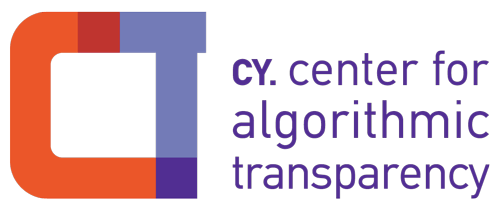Hereby we are glad to announce that the Knowdive group is now a partner in the CyCAT H2020 Project for next two years. The main goal of the CyCAT is to address the emerging research problem of Algorithmic Transparency, and establish a network of researchers from European countries including Cyprus, England, Israel, Italy, and Scotland.
About CyCAT
The Cyprus Center for Algorithmic Transparency (CyCAT) is hosted at the Open University of Cyprus, the second public university in Cyprus and the only one dedicated to open and distance education.
We collaborate with other researchers internationally and have recently teamed up with four leading universities across Europe and Israel through an H2020 Twinning grant. Our team holds key expertise in the algorithmic processes involved in information access, user interactions with algorithmic systems, user-system interaction, as well as the social and cultural implications of algorithmic processes.
Our Key Objectives:
- Promote digital literacy through raising citizens’ awareness of the ways in which data analytics and algorithmic processes affect their access to information and opportunities
- Develop computational methods, personalized tools, as well as innovative training and education programs
- Promote a Responsible Research and Innovation (RRI) culture
Research Methodology
According to the Association for Computing Machinery (ACM), in its statement on Algorithmic Transparency and Accountability [1], many algorithmic processes are opaque. For instance, it is often difficult to interpret results from models induced by new machine learning techniques such as deep learning [2]. In addition, there are social and economic challenges for achieving algorithmic transparency, such as the need for developers/owners of such processes to protect trade secrets, or even the privacy concerns of users.
Given these considerations, as well as the rapid changes taking place in the information landscape, such as the consolidation of information services worldwide, our first assumption upon which CyCAT will be structured is: users require tools (both technical and educational) to help them become aware of algorithmic processes in the systems they use.
CyCAT is inspired by of the ACM Statement’s principles for promoting algorithmic transparency and accountability. Three of the seven principles describe approaches to combating algorithmic biases that can be applied by researchers, even without access to a given system’s inter-workings:
- Awareness: Researchers can raise stakeholders’ awareness of the potential for biases and social harms that could result from developing and using a given analytic system.
- Data provenance: Researchers can facilitate the exploration of the potential biases brought about by human and automated data-gathering processes that are used to create training data for algorithmic systems.
- Validation and testing of outputs: Researchers can develop rigorous techniques for testing models and assumptions used in analytic systems, evaluating the potential of social, discriminatory harm.
The above principles are also the basis of the second assumption upon which CyCAT is structured: solutions for promoting transparency, even for opaque processes, can be developed by third parties, based on observing and analyzing system inputs and outputs, as well as user behavior.
Therefore CyCAT focuses on understanding the nature and impact of human biases in information systems, and develops tools, techniques and trainings to promote algorithmic transparency and media-related algorithmic literacy.
Meet Our Partners
Trainings and Workshops
You can contact us if you require more information on Algorithmic Transparency. CyCAT can offer tailored training or workshop events according to your requirements, audience and level of expertise to promote digital literacy, and in particular algorithmic literacy.

